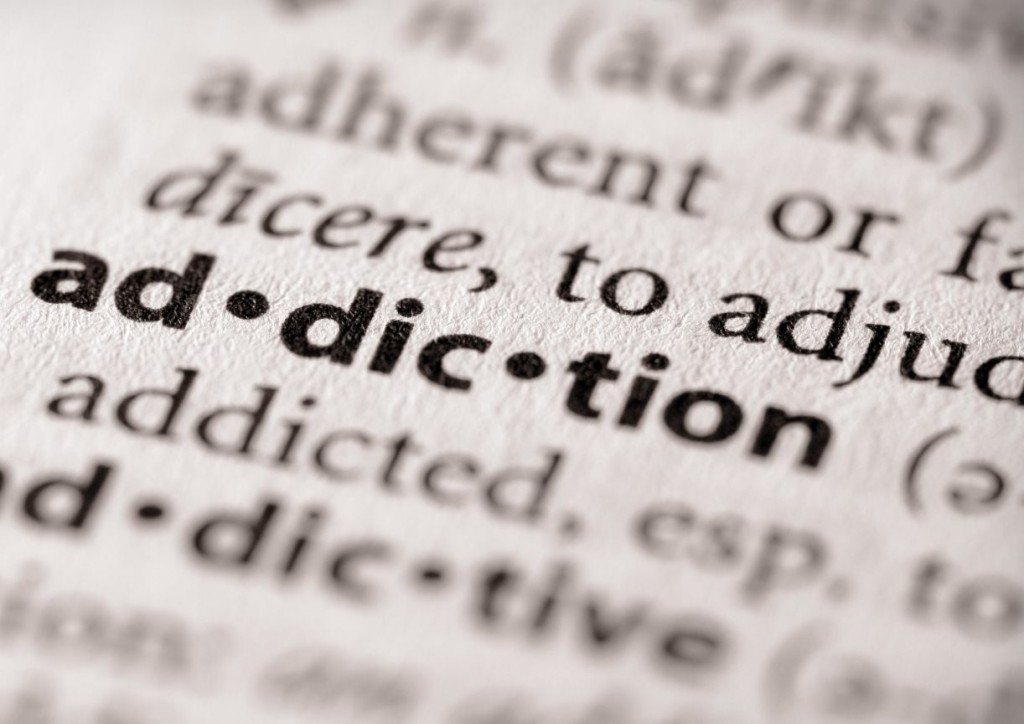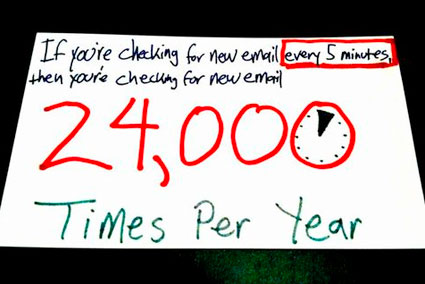Confessions of an addict
Ok, I confess.
Publicly even.
(No, this is not an admission of not blogging for 6 weeks…I’m working to fix that).
Here’s the bottom line: I’m an addict. And I’m working hard to get help.
What I’m addicted to is pretty common, but I don’t want that to be an excuse or justification for my actions because it’s still an unhealthy compulsion.
Do you want to know what I’m so powerfully drawn to?
The answer might surprise you.
It’s email!
Now, don’t get me wrong. Email is a huge part of my ministry life, my work life and my personal life. I get up to 100 emails in a given day (not including the junk) and I would probably drop some balls, get fired and maybe even lose some friends if I stopped using this tool.
But like any tool, it can be misused. And like many A-type personalities, I’ve been known to radically abuse this wonderfully useful tool.
Like I said, though, I’m learning how to master it. If you find email taking control of your life instead of you being in control of it, and you are really interested in freedom, then sit down, buckle up, and keep reading, because my solution might be a bit hard to swallow.
But it’s the only thing I’ve found that works.
First let me tell you how I overcame another addiction.
When I was in my late teens, I found myself spending a lot of time indiscriminately sitting in front of the television. You see, for the first time in my life I had access to cable. And I became a world-champion channel surfer. After a few months of this—when I realized that not only did I have bags under my eyes, but also that I had stopped having any time to do anything productive—I started looking for a solution. That’s when I came across the principle of scheduling my TV watching.
This was before DVR (which makes scheduling much easier now), but the idea was that prior to even turning on the TV, first you discovered what was on that week and you scheduled what you wanted to watch. Thirtysomething. LA Law. The Nightly News. A football game. Letterman. Whatever. (Am I showing my age?) That way you only turned on the TV when the show started, and then turned it off when it was over.
It was a huge help. I’m not saying I that never channel surf anymore, but honestly to this day watching too much TV is not an issue with me.
And you can probably guess where I’m going with this.
As I was looking for a solution to my email addiction and overload, I ran across the same principle I had learned about with TV a couple of decades back. Scheduling my email!
The idea goes something like this: Email is a tool that you should control, it should NOT control you. When you spend all day answering email, it takes you away from important and thought intensive tasks that you should be focusing on. And the more emails you send, the more you receive, until you have found your day filled with multitasking multiple “conversations” and projects at the same time. And when you try to do it all at once nothing gets your full attention; and when nothing gets your full attention, you do half-hearted work, and go to be feeling like you got nothing done all day, though you worked really hard.
Any of that sound familiar?
To avoid this downward spiral, I’ve discovered a few tips that I’ve been working out in my own life over the first three months of 2012. These have been so revolutionary for me, I wanted to share them with you, even while I was still learning how Slots to put them into practice:
1. Turn off all auto email downloads. Only allow yourself to check email manually, or, even better, schedule when you want it to come in. If you have been working with email for a few years then you have trained yourself (like Pavlov’s dogs) to have a quick little adrenaline boost when that email chime is heard…and you have a real hard time just leaving it there if you know there is an email. Not seeing that emails are piling up (even if you suspect they are) is a big step towards getting control in this area.
2. Only check email when you choose to do so. This is very, very difficult, but brutally important. I’m not going to say you have to only check it two or three times a day (though many experts recommend this). However, getting control of this part of your life means that you must have the control. Decide when it works best for you to read and respond to email. Maybe for you it’s five times a day: 9am, Noon, 3pm, 5pm, 10pm.
I’ve discovered that when I check email in batches, I can really get through them much more quickly. I’ve also found that when I’m only checking email a few times a day, I don’t generate as much email that then causes others to generate email back to me. The cycle slows down.
My advice: Take care of your devotions and other important issues first thing in the morning, don’t let work stress pile up before you have had time to wake up. And, don’t check your email within a couple of hours before you go to bed. Talk to your spouse, read a book, or even watch (scheduled) TV instead.
3. Get your in box down to 0. While this is tough, it’s also very helpful. When you have 100 emails sitting in your box that you have not made decisions on, your brain is running a background app as it’s trying to take care of all these issues waiting for your response. I’m finding each email has 4 possible outcomes; it can be:
1. Deleted without response—you’d be surprised at how many emails don’t actually demand a reply.
2. Delegated to someone who can take care of it—easier if you are working with a staff or a team.
3. Documented in a file, a to do list, or a calendar for future use—for projects, appointments, etc…
4. Simply answered when you see it. If an email demands an answer that needs some further thought, turn it into a mini-project to work on and send a quick response with a time frame attached. For instance: “I can’t answer this now, but I’ll process it and get back to you by noon tomorrow. (But honestly, most people are fine with “noon tomorrow” without you telling them).
I’m not suggesting that this is the only way to process email; there have been books written on the subject. But however you process it, do whatever you can to get your in box as small as possible to avoid the dread that opening your email could bring with it.
Honestly, I have not perfectly followed my own plan. As with any addiction, there are good days and bad days. But when I limit my email to work with and serve my schedule instead of me serving it, I have found that not only can I accomplish much more, but that my mind is less cluttered and distracted, and that I have the time and energy to focus on things that usually get crowded out of my day.
How do you rule your email? Do you have any further tips regarding how to make this tool serve you instead of you serving it?


